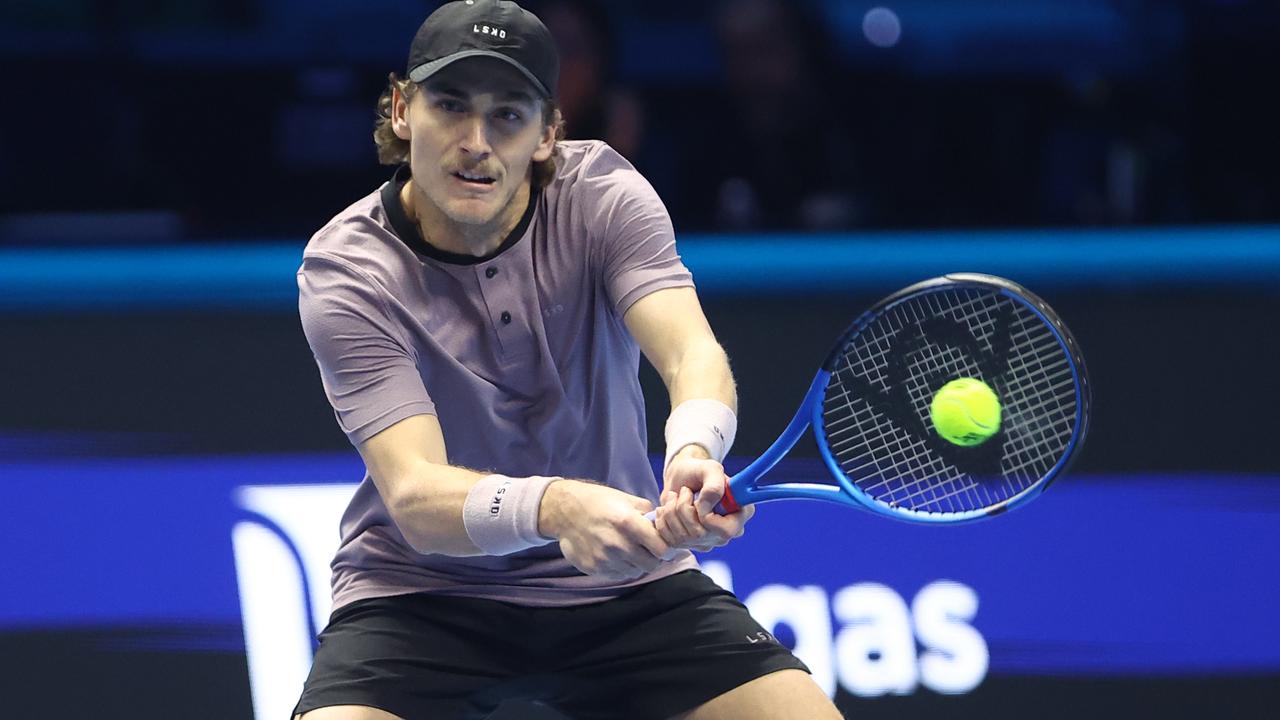Novak Djokovic beats Carlos Alcaraz to win gold medal at 2024 Paris Olympic Games
Grand slams don’t make Novak Djokovic cry. But winning the gold medal for his country at an Olympic Games? These were the emotional scenes after the tennis legend won the last thing left on his to do list.
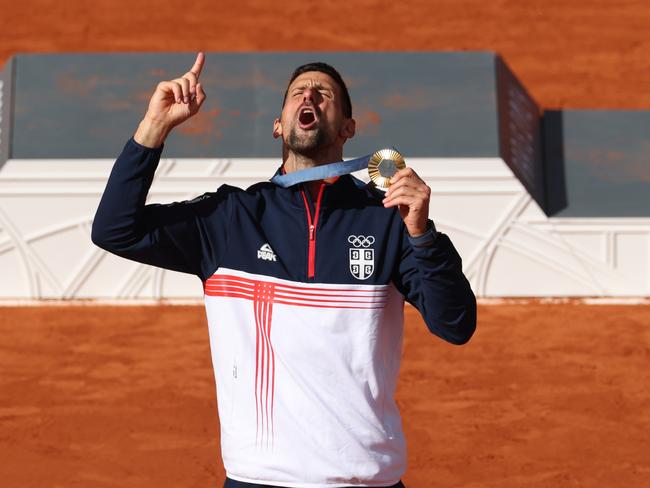
Tennis
Don't miss out on the headlines from Tennis. Followed categories will be added to My News.
Novak Djokovic has pulled off the most incredible and significant victory of his life to become Olympic champion.
He’s conquered Carlos Alcaraz in two thunderous tie-break sets at Roland Garros to put a gold medal and exclamation mark on what was already the greatest career in the history of men’s tennis.
Exhausted, his eyes bloodshot from weeping, the great Serb said: “I’m still in shock. I put my heart, my soul, my body, my family, my everything on the line to win Olympic gold. At age 37, I finally did it.”
What an enthralling match. What a colossal venue. What an adrenalised atmosphere. What an achingly important result for Djokovic. This was sport, beautiful sport, at its iron-willed, dramatic, theatrical best.
Famous old Roland Garros, the dear thing, and the sun was out, and it felt like 15,000 football hooligans had jagged tickets to the tennis. And we witnessed a match for the ages amid dueling, deafening chants between Spanish and Serbian supporters. Nole! Carlos! Nole! Carlos! Interminable rallies. The ball went like a rocket from one end of the court to the other. Nole! Carlos!
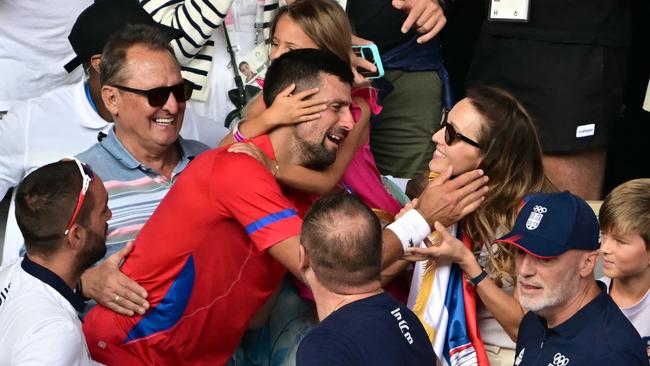
Djokovic entered beast mode. Fight mode. Rarely if ever have you seen him so locked in. So desperate. So ravenously hungry. He played every point as if his life and legacy depended on it. The battle was physical, psychological. So riveting the Eiffel Tower leant over to take a look.
They should have slipped on some boxing gloves and duked it out. It was that intense.
Djokovic stared down the young Spaniard. He won 7-6 (7-3), 7-6 (7-2). Two sets of breathtaking, full-throttle, completely extraordinary tennis took nearly three hours. You wished it would never end.
“Did it,” Djokovic said.
Alcaraz hit a hundred great shots, and then a hundred more, but it wasn’t enough. He constantly pushed the 24-time major to the back fence with a barrage of deep groundstrokes and then he dinked the ball short with a drop shot carrying the vicious spin of one of Eddie Charlton’s trick shots on a pool table.
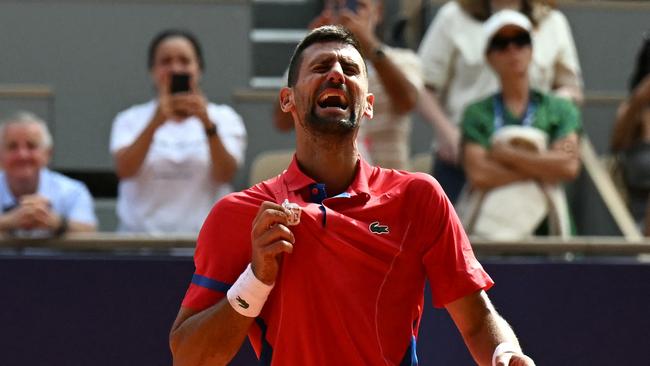
Djokovic pleaded to his entourage, “What do I do?” They looked at him like, “As if we’d know!” He worked it out for himself.
He found total and absolute grit, desire, desperation and willpower. He kept staring at Alcaraz. Don’t you ever give up? Alcaraz stared back. Don’t YOU?
Djokovic had no right to win. Alcaraz had more power and energy but Djokovic scraped, clawed, spat and fought. He threw the kitchen sink, fridge and all the utensils. Won two tiebreakers of the highest caliber.
His grunts sounded more like groans. He was pleading with the tennis gods. Please let me win Olympic gold. Please. It was anguished. The sort of noise you might make when you stub your toe.
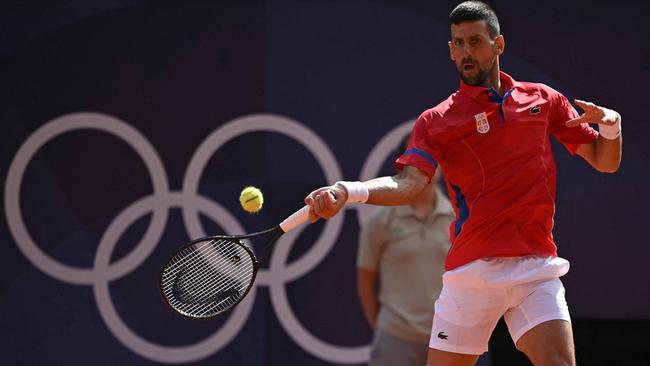
It was bloody hot at the empire of dirt, and Djokovic was exhausted, putting ice towels on his head at changes of ends, doubling over in fatigue, but finding one more push to the line. He might have done a Pheidippides and dropped dead on the spot.
Instead, he celebrated with pure, unrestrained emotion. Majors don’t make him cry. The Olympics do. Trembling, he fell to his hands and knees. He wept and wept and wept. Climbed into the grandstand on Court Philippe-Chatrier and wept some more. Alcaraz’s bottom lip trembled and he shed a few tears himself.
It was one of the great arvos in modern tennis. Djokovic kissed one of the few things he couldn’t buy with his $282 million in prizemoney. Olympic gold. The smallest trophy in his collection might mean the most to him.
A proud man has never looked prouder. And never before have the words on this tremendous grandstand been more appropriate: “Victory belongs to the most tenacious.”
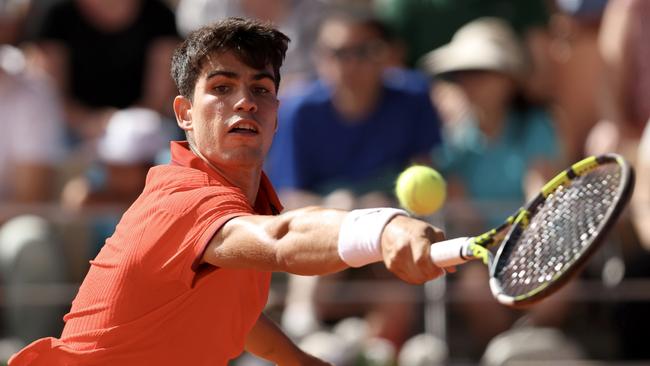
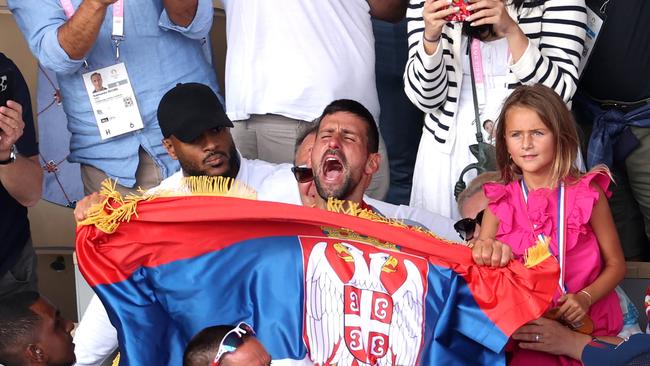
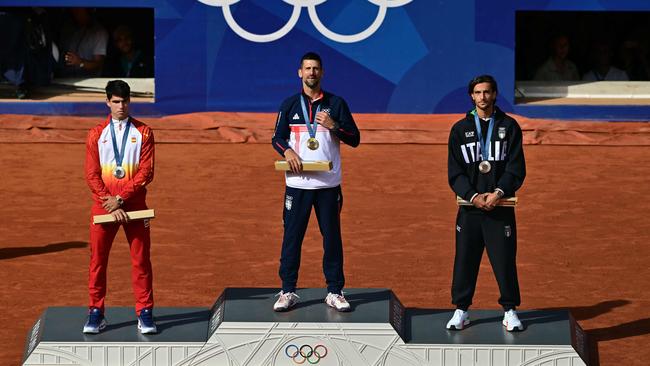
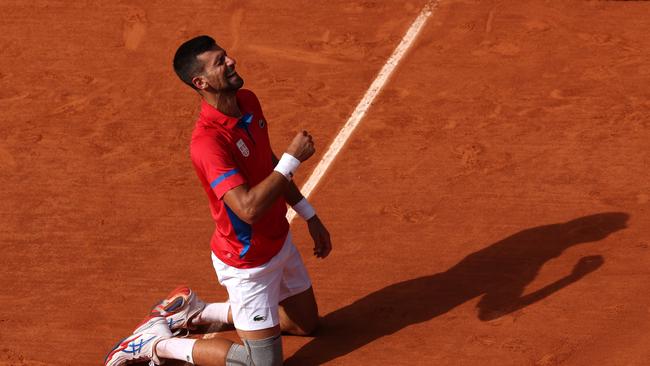
BETTER THAN ANYTHING I IMAGINED
The weeping, trembling, lip-quivering, temple-busting, fist-shaking, hands-on-knees, flag-waving, medal-kissing, best-moment-of-my-life emotion. Explain yourself, ironman. We thought you were immune to these tender emotions.
“I put my heart, my soul, my body, my family, my everything on the line to win Olympic gold. At age 37, I finally did it,” Novak Djokovic said after beating Carlos Alcaraz at Roland Garros to realise his final lifelong dream of becoming Olympic champion.
“I thought the 2012 opening ceremony in London, and carrying the flag for my country at the Olympic Games, was the best feeling an athlete could have. Until today. This supersedes everything that I hoped and imagined I could experience and feel. I carry proudly the Serbian flag. It is something that really drives me and motivates me. I was against a 21-year-old who is the best player in the world right now. I played incredible tennis. I am an Olympic champion. When I take everything into consideration, this is the biggest sporting success I’ve ever had in my life.”
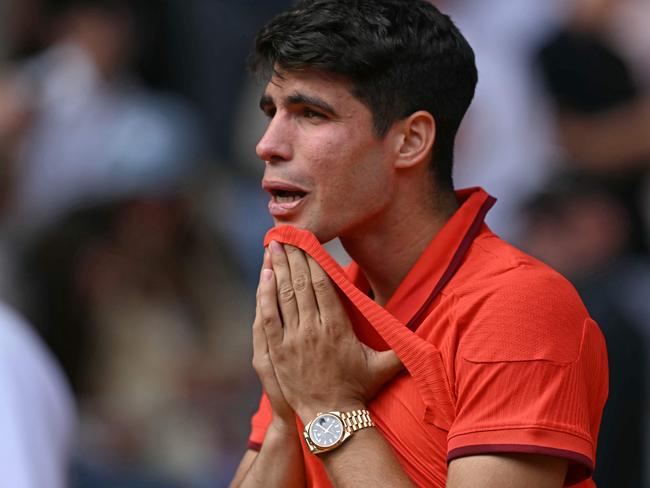
Wow. Because we used to think tennis players didn’t really a hoot about the Olympics. Djokovic has celebrated his 24 major triumphs with a combination of machismo and arrogance. Thumping his chest, pointing a finger to the sky, numero uno, the king. The Olympics were different. None of those major triumphs have made him bawl and bawl and bawl as uncontrollably as he did after his fourth Olympic campaign ended with his first gold medal thanks to an ironwilled 7-6 (7/3), 7-6 (7/2) win.
Keep explaining yourself, big fella. “I absolutely had doubts I could win,” he said. “But the belief and conviction that I can make it is stronger than my doubts. It always has been. The Olympic Games come every four years so the opportunity to win gold for your country is very rare. I’m 37. I don’t know how many more chances I’ will have. I knew that, I knew everything. I had to deal with all of it internally and silence all the noise around me. That was the biggest battle to win. I’m super-thrilled that I did it. I am honestly over the moon. The Olympics are different.”
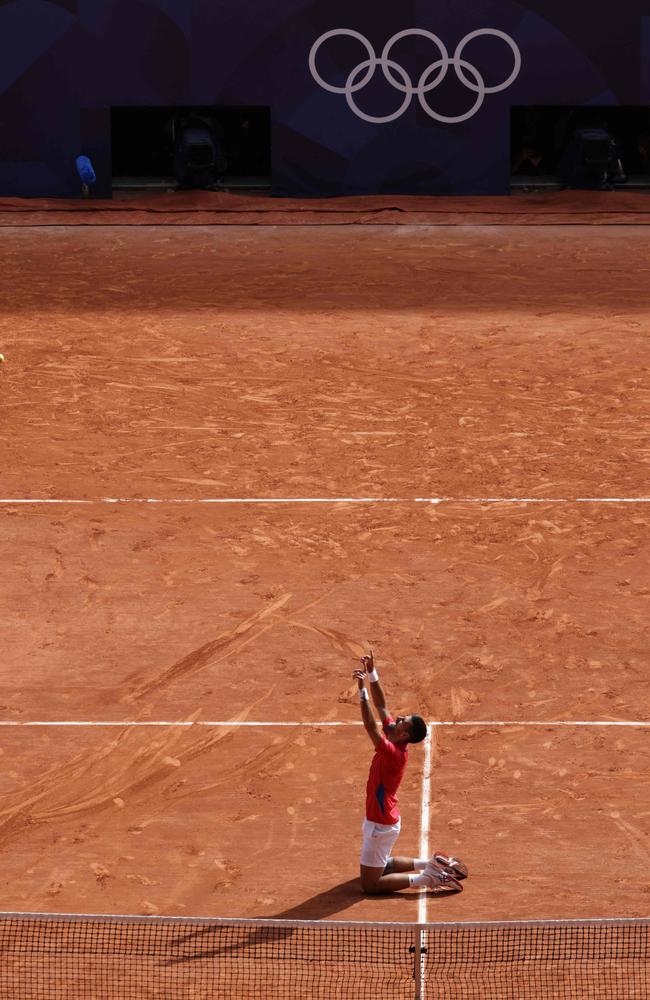
Go on. “Everything I felt in that moment of winning surpassed everything I hoped and thought it would be,” he said. “Best feeling ever. Being on that court and seeing the Serbian flag raised, and singing the Serbian national anthem and getting the Olympic gold around my neck, I think nothing can beat that in terms of precious moments. I have dreamed of this for many years and now it is all happiness, joy and celebration.”
Djokovic was tired, emotional, expansive. “This definitely stands out as the biggest sporting achievement I have had because of all the things I have faced, experienced and encountered to be here. All my failures at past Olympics. For many years I wasn’t able to win a medal for my country. That was catching up to me. That was building the pressure more and more. That’s why at this moment of time in my career and my life, this stands out as the highest of the highs.”
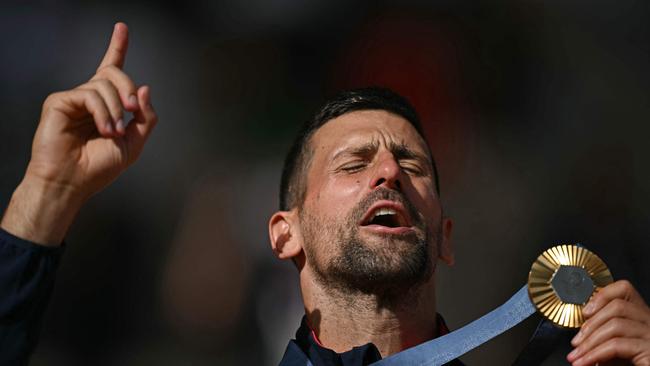
Retirement? Djokovic reckoned he would defend his Olympic crown as a 41-year-old at the 2028 Los Angeles Games. Djoker for president? He was asked by a Serbian sportswriter if he fancied running the country. Might get a few votes at an election. “My friend, I am happy with where I am in my life,” he grinned.
Djokovic kept looking at his medal like Tom Cruise looked at Renee Zelweger in Jerry Maguire. You complete me. “Yes and no,” Djokovic said. “Yes, my career is complete because all the achievements are done with this gold medal. But no, because I love this sport and I don’t play it only to win the tournament. I love the competition. I love the drive. I love working every day, every week, training my body, perfecting my game. Improving myself. This sport has given me so much in my life. I try to give back to the sport. I do it with my dedication and sacrifice.”
More Coverage
Originally published as Novak Djokovic beats Carlos Alcaraz to win gold medal at 2024 Paris Olympic Games





